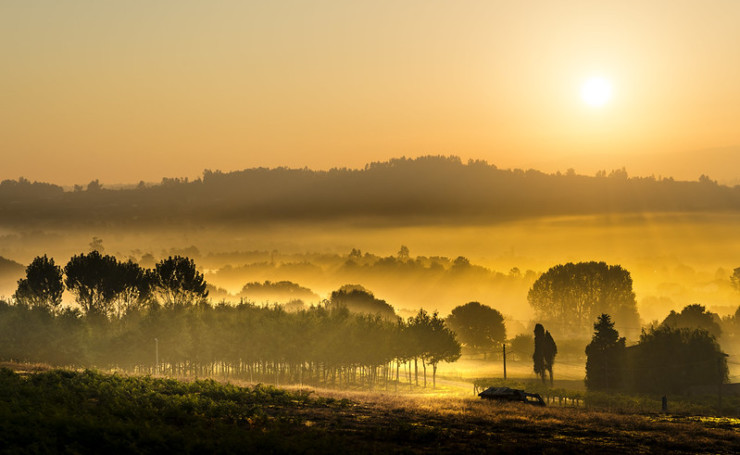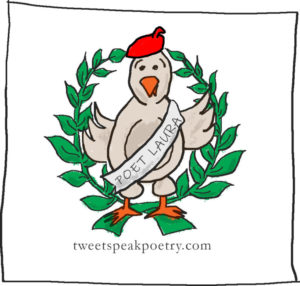One of my assigned duties as Poet Laura is to “Write, draw attention to, explore the history of, or leave on bulletin boards — poems about Lauras.” These past few weeks, I’ve been on the job.
Lauras and poetry have a significant history. The fourteenth-century Italian poet Francesco Petrarch wrote hundreds of poems, mostly sonnets, about Laura de Noves, a woman he admired from afar but never courted because she was married.
But wow, was he into her:
Sweet air, that circlest round those radiant tresses,
And floatest, mingled with them, fold on fold,
Deliciously, and scatterest that fine gold,
Then twinest it again, my heart’s dear jesses;
Thou lingerest on those eyes, whose beauty presses
Stings in my heart that all its life exhaust,
Till I go wandering round my treasure lost,
Like some scared creature whom the night distresses.
I seem to find her now, and now perceive
How far away she is; now rise, now fall;
Now what I wish, now what is true, believe.
O happy air! since joys enrich thee all,
Rest thee; and thou, O stream too bright to grieve!
Why can I not float with thee at thy call?
Although I know they’re out there, I haven’t found many post-Petrarchan Laura poems — yet. So it’s a good thing I’ve been tasked with adding a few to the canon. But first, a little history on the name.
Laura is derived from laurus, which is Latin for “bay laurel,” the leaf used in victory wreaths and savory soups. Laura was a very popular name in the United States in the late nineteenth century and remained in the top 50 into the early twentieth century. Then it dropped in popularity, peaked in the late ’60s, dropped again in the ’70s, experienced a brief revival in the ’80s, then dropped again, seemingly for good. For 2019, the name was number 274 in popularity, 67 down from 2018 and 264 down from 1969.
The youngest Laura I know is 17, the oldest, 58. I have over a dozen Facebook friends named Laura— and that’s not counting the Lauries, Laurens, and Laurels in my life. They include previous classmates, neighbors, and coworkers; school moms; and a number of literary Lauras. In fact, L.L. Barkat, founder and editor of Tweetspeak Poetry, is—you guessed it—a Laura, and an influential one at that. I dedicated my book How to Read a Poem to her.
Since starting my post as Tweetspeak’s first Poet Laura, I’ve written two Laura poems: one about a Laura I know pretty well, and the other about one I’ve never met.
First, Laura Brown. Even though we live hundreds of miles apart, we’ve gotten to know each other quite well over the years at various writing conferences, workshops, and retreats. (We’ve also developed a habit of playing Irish music whenever we’re together—she on whistle and I on fiddle.) This Laura is a force of inspiration, laughter, and encouragement wherever she goes.
I composed this found poem using a number of phrases from Laura Brown’s own Facebook and Instagram posts. As a keen observer and devotee of life’s daily beautiful moments, Laura demonstrates a spirit of gratitude I’ve come to admire. In writing a poem about her, I wanted to inhabit her words and allow them to inhabit me.
New Every Morning
–for Laura Brown
And look! It’s a new day with no mistakes in it yet,
leaves and lines and light
sluicing over the bookcase.
She climbs into the writer’s seat,
peace lily riding shotgun on a table
among daubs of urban orange.
She can’t help reporting
on what she has seen and heard,
her vision and pen
two bumblebees working the same thistle.
A drain rack of clean dishes.
Warm stack of folded laundry.
Toasty edges of cheddar crackers,
and Pittsburgh wound up
in a gauze of snow.
The day’s beauties draw near
as fragile as they depart:
an old woman’s face
rising out of a dab of suds,
adolescents marching
into the light of their moonrise drums.
Day is done, but morning
keeps breaking and breaking.
She tells us this, even when
we forget, even when we don’t want
to know. Like it
or not, it never gets old.
Even when light hits a dead end,
it finds a way out.
My next poem was inspired by Laura Lees, who is married to Jake Lees, another writer I’ve crossed paths with at conferences over the years. Although I’ve never met her, we became Facebook friends, and I’ve taken utter delight in her fun-loving pictures and posts. I asked Jake to send me a few photos he thinks really capture her spirit, and he happily obliged. (They’re pretty much the cutest couple ever.) I suppose you could call this one an ekphrastic poem of sorts:
Pictures of Laura Lees
When you wear dinner plate sunglasses
as you lean on the fence
by the cougar display at the zoo
nothing but the slender smirk
at the corner of your lips
gives away your ardor
for dopey jokes and leafy shadows
for the person holding up his phone
trying to capture you
and when a coffee mug blocks
those lips, your eyes
(autumn-pond blue with fish
flicking up sparks) say the same thing:
the world is ridiculous, and I love it
so much. Come, let’s catch it if we can.
I’ve got quite a few more Lauras to commemorate in verse over the next year. Chances are pretty good that you know a Laura or two as well (maybe not a newborn baby, given the stats, though that would be a big bonus). What if you challenged yourself to write your own Laura poem? What lovely Laura would you celebrate, and why?
Photo by Noel Feans, Creative Commons license via Flickr. Post by Tania Runyan.
__________________________

“I require all our incoming poetry students—in the MFA I direct—to buy and read this book.”
—Jeanetta Calhoun Mish
- Flowers of California: California Poppy - December 8, 2022
- Flowers of California: Lily of the Nile - October 13, 2022
- Flowers of California: Crape Myrtle - October 5, 2022


Laura Lynn Brown says
I’m so honored to have a found poem written from my words, Tania. Thank you for your kind words here. And I’m glad to meet another Laura through your poem about her. I look forward to your additions to the canon of Laura poems.
Tania Runyan says
Lauras rule!
L.L. Barkat says
These poems of yours: *love!*
Thank you, Tania, for a fun, informative, and even poignant post on poetic Lauras. Petrarch owes you one. 🙂
Tania Runyan says
He sure does!
Megan Willome says
You’ve perfectly captured Laura Brown. Well done, you!
Katie says
Agree totally, Megan!
Really like Tania’s statement about Laura Brown:
“As a keen observer and devotee of life’s daily beautiful moments, Laura demonstrates a spirit of gratitude I’ve come to admire.”
Katie says
Lovely Laura
Now in your ninety-fifth year
your eyes sparkly as ever
Crows feet a plenty
pull up that sweet, sweet smile.
Your wavy white hair
hasn’t let go,
but frames your kind face
dear pretty woman.
Tucking you in
you say it again,
It’s been a good day.
Yes, my dearest Annie Laura
it has been a good, good day
since we got to spend it together.
You amaze me by how you
press on, ever forward
longing for Home.
I love you so
my favorite Laura
in the whole wide world.
(This is in tribute to my mother, Laura Keith Spivey, my hero.)
Tania Runyan says
Thank you for sharing your own lovely Laura poem!
Katie says
You are so welcome, Tania.
I am so thankful for prompts that call up memories and depths of feeling in my heart.
Gratefully,
Katie
Will Willingham says
You know, my first attempt at the Poet Laura chicken was drawn on a badge – shield-like. And it was given back with request to add laurels instead of the shield. And I am a bit chagrined to think that until I read this I didn’t connect the Lauras and laurels.
Sigh.
Lovely Laura-poems!
Tania Runyan says
Maybe I should start writing poems for the Laurels I know, too!